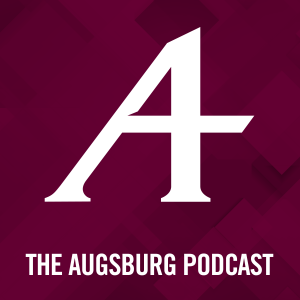The Augsburg Podcast

Diane Pike: The Sociologist’s View
Diane Pike: Augsburg needed to be what it was for the Lutheran students from the small towns, for the people who wanted to go to sem ... seminary. And now we need to be something else.
Paul Pribbenow: I'm Paul Pribbenow, president of Augsburg University. Augsburg educates students to be informed citizens, thoughtful stewards, critical thinkers, and responsible leaders. It's my great privilege to present the Augsburg Podcast, one way you can meet some of the faculty and staff I'm honored to work with every day.
Diane Pike: My name is Dianne Pike, and I'm a faculty member in the Sociology department. I grew up in Connecticut, and my father was a newspaper man; he was a journalist. I had had a sociology class and recognized that the structure and the vocabulary that sociology provides was very similar to what I saw happening in the news world with my dad. And it also gave me a way to make sense of things that I had been paying attention to and didn't have the vocabulary for. And we're lucky enough to have the kind of students here at Augsburg who are really eager to make sense of a world that's really complicated.
We want people to question what they take for granted, and we want people to have the tools to access the information and the data that could help them see something in a different way. I just said it in class this morning, "Personal opinion is no substitute for evidence." So that's a constant theme in what we try ... what I expose them to and what I try to get them to reflect on.
I know that I can't tell by looking at my students whether they come from affluence or not, but I know that the range is there. I know that students' ability to process information might be different. I can look across my students in the room and know there will be a range of students who think about sexuality differently. So, it's a fabulous place to teach because you can't do it one way, and you can't do it on autopilot.
When I arrived at Augsburg in the early 1980s, right, it was really about whether you were a Peterson or an Anderson. And the traditional orientation of Augsburg serving lots of Lutheran students, maybe many of them from small towns, that challenged my teaching, because I'm from the east coast, and I'm used to being in a place where you and I could argue about ideas and then go have a beer, and you come here and you argue with people about ideas and they don't talk to you anymore. And that was a real challenge here, and that was a real problem here in the culture, um, a very conflict avoidant culture, and a very reticent culture. That was a really big adjustment.
But what I've seen over the 35 years of my career has been this evolution of the institution in response to the changing needs of the community and the changing needs of society. And I think we are known now as a place where people want to come because of the diversity, that there's a genuineness to that.
As many people may know, we have a nationally known program that helps students who are in recovery. I would hypothesize, I would have to test this, that we get a significant number of students from the recovery program attracted to sociology, because for most of their lives, and certainly in most of their recovery, everything has been focused on either the biochemical or the psychological. And so to think about sociological explanations for phenomena, be it mental illness or addiction or other forms of behavior, is eye-opening for many of those students.
My area of expertise in sociology is the scholarship of teaching and learning. And so, um, I've been able, across my career, to bring sociology to teaching and learning and faculty development, and to bring what I've learned as ... I was director of the Center for Teaching and Learning for seven years, to bring what I've learned in faculty development to the discipline of sociology, because teaching is fundamentally a social relationship; it's not a set of characteristics, which is why I'm not very excited about, you know, online learning and clicking as a way of getting an education. And what we do here for students is have those relationships that you can't get from clicking your way through an online course.
The students here are so beneficial to me in the sense of helping me understand how they see the world now, helping me think about the future. What are the challenges that we're gonna face as a society? Because as a sociologist, that's what we wanna answer are these big questions.
Paul Pribbenow: That was Diane Pike, professor of sociology at Augsburg University. Thanks for listening to the Augsburg Podcast. I'm President Paul Pribbenow. For more information, please visit Augsburg.edu.






 Visit Podcast Website
Visit Podcast Website RSS Podcast Feed
RSS Podcast Feed Subscribe
Subscribe
 Add to MyCast
Add to MyCast